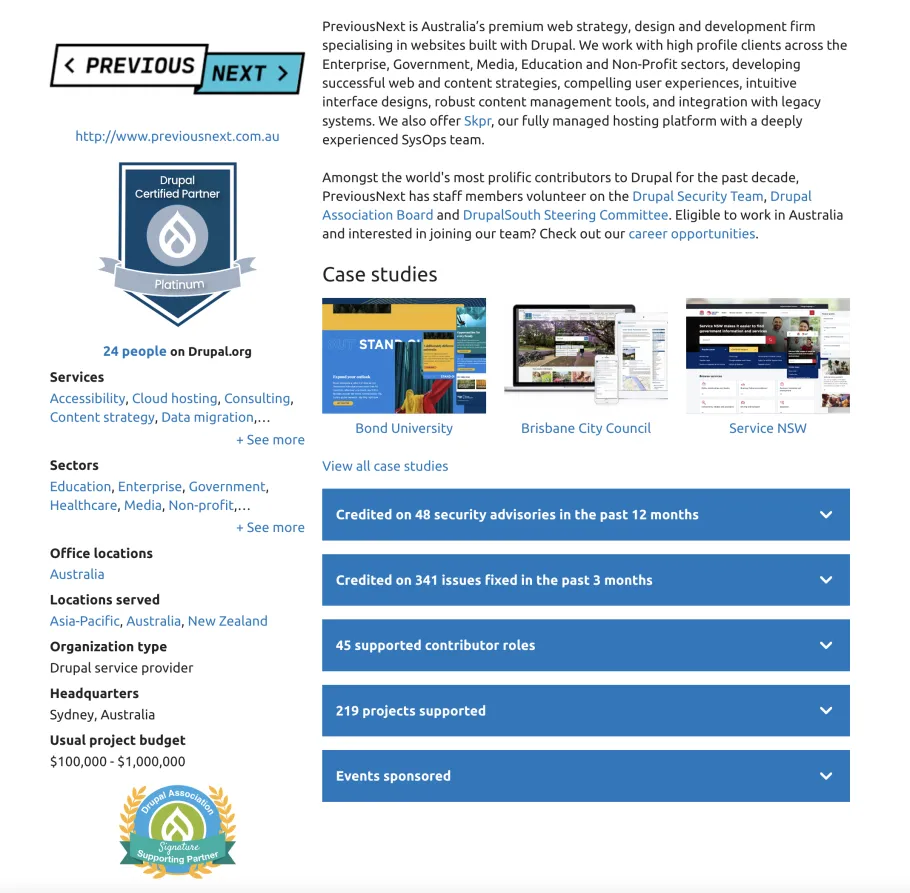
Owen LansburyCo-Founder & Chair
Contributing makes good business sense, especially when open-source technology, such as Drupal, is at the core of everything you do (pun intended!).
Based on a talk given at EverythingOpen 2023. A video of that presentation is also available at the end of this article.
Adopting a formalised approach to contribution helps our business stay sustainable in the long term. It also has the added benefit of helping everyone else in the open-source community.
Over the years at PreviousNext, we’ve honed a deep expertise in Drupal. That’s because we’ve doubled down and avoided diluting our technical offering. We’re all in for Drupal.
This level of knowledge sees us regularly referred to clients looking for hard hitters in the Drupal space. Our expertise is particularly appealing, as it happens, for our Higher Education and Government clients. Being Australia’s only Platinum Certified Drupal Partner can only help in this regard.
Our Drupal Association profile records all our contributions as ‘credits’. These determine our ranking as a certified partner, demonstrating our commitment to Drupal as a technology and a community.

We focus on raising our Drupal profile using means other than traditional marketing methods. Our team attends events, volunteers at DrupalSouth, presents at conferences, sponsors the DrupalSouth CodeSprint, and takes on community leadership roles.
This level of involvement cements our position as a leading Drupal provider. It also gives all members of our team (including those who are non-technical) additional opportunities to be part of the community and raise their profiles.
I like to refer to Drupal as a ‘do-ocracy’. Everyone is welcome, and all help is welcome. Open-source and open-handed. It’s the same sense of community that we value at PreviousNext.
When someone first joins our business, we often use open-source contributions as the primary method of onboarding them. This induction method encourages them to develop best practices in their coding and use their involvement in the Drupal project as part of their ongoing professional development.
An offshoot of this is the chance to build relationships and be mentored by people external to our organisation. It’s a unique opportunity to broaden our collective perspectives and work alongside (and become!) some of the brightest minds in open-source tech.
Avoiding team member burnout or a lacklustre approach to work is vital for us as a smaller organisation. Instead, we help staff to scratch those different ‘itches’.
Working on contrib helps to maintain interest and passion by giving staff time to work on projects that aren’t run-of-the-mill client engagements. It also exposes our team to larger initiatives than they might otherwise work on.
A happier team, in turn, leads to a more stable team over the long term. Our retention rates have steadied at around three times the industry average.
This tendency towards longevity also facilitated our decision to make PreviousNext employee-owned.
Enshrined in our Staff Handbook is the hope that employees at PreviousNext will use 20% of their time for contrib (the remaining 80% is billable client work). If a team member chooses not to contribute, they work closer to fully billable hours.
We don’t expect staff to contribute outside their employed hours–though many do for their own interest.
With a robust time-tracking and self-management culture, this approach works well and leads to a productive, well-run company.
We’ve also baked open-source contributions into our regular ‘Hackdays’. These are days when our developers get together and innovate. This focused work feeds into our client projects and becomes part of our Drupal contributions.
Other methods for ensuring a regular flow of code include directly sponsoring developers, which helps us maintain our partnership status.
We also use project-based sponsorship to contribute patches and new modules to the Drupal ecosystem. The clients for these projects also receive credits for sponsoring this development.
Open-source contribution isn’t just about altruism. It also shouldn’t be viewed as a drain on a business’s income generation. It’s about recognising that our businesses depend on a technological ecosystem that in turn relies on as many of us playing our part to advance it as possible.
When it comes to Drupal, the result of these contributions is a platform that commands a 10% share of the top 10,000 most visited websites globally. Clearly, though, there is more to be done to promote Drupal even further. It’s something we can all get behind, because when our chosen open-source platform thrives, so do our businesses.
As we enter our 14th year of operations in 2022, PreviousNext is taking a bold step into employee ownership, utilising a groundbreaking approach that’s only recently become possible in Australia.
PreviousNext builds open source digital platforms for large scale customers, primarily based on Drupal and hosted using Kubernetes, two of the world’s biggest open source projects. With our business reliant on the success of these open source projects, our company is committed to contributing where we can in relation to our relatively small size. We get a lot of questions about how we do this, so are happy to share our policies so that other organisations might adopt similar approaches.
I recently had the pleasure of presenting my session 'How Drupal Contribution leads to Success' at Drupal South Canberra 2018.
Drupal adoption is still growing, but can the contributors keep pace? In this session I looked at how organisations can really benefit from contributing to Drupal.